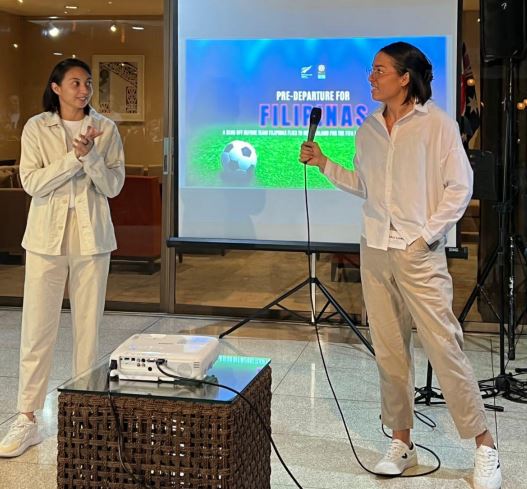At one point or another, most Filipinos have had the experience of sleeping on a banig – a colorful mat made of woven fibers, expertly intertwined by expert fingers.
While the humble banig is definitely a more affordable alternative compared to foam or spring mattresses, today, the banig is more than just a place to lay down — thanks to Woven.
Woven is the brainchild of NGO staff and Jesuit volunteer John Francia and marketing professional Trish Lim. In a nutshell, the social enterprise “sells banig handicrafts from Basey, Samar to help keep the weaving industry alive.”
“The business was conceptualized after John spent a year as a volunteer in the town of Basey, post-Haiyan,” Lim told Expat.
“The weavers in Basey make these beautiful banig mats but they get only about PhP150 (roughly USD $3) a week — that’s PhP600 (about USD $12) a month for something that’s so difficult to do. Through Woven, we want to expand their market, provide income for the craftsmen and women, and inspire a new generation to continue the tradition,” she explained.
Weaving a banig the size of a single or double mattress could take weeks, even at the pace of veteran weavers of Basey.
“It is very difficult work… It is painful. And it pays very little. But I’ve been able to send my kids to college because of it,” Mana Clarita, the 60-year old auditor of the weavers’ association, shared.
Francia and Lim decided to showcase these products by making it more relevant.
With the help of ABS-CBN Lingkod Kapamilya Foundation and Bayan Academy (the non-profit organization where Francia worked), Francia and Lim started Woven in 2014 by organizing weavers and artisans from 20 villages into what they call “community craft associations.”
“Keeping the weavers in mind, it is Woven’s hope to keep the money flowing into Basey, and help artisans earn at least PhP3,000 a month from weaving and embroidery… We maneuvered an increase in the price of banig and raised individual incomes by an average of 45 percent,” Francia and Lim explained. “Utilizing traditional methods and materials, we want to create new and innovative products that can breathe new life into Basey’s banig industry.”
Today, Woven offers gadget covers for tablets and laptops, and stylish bags made of lovely woven banig.
“As a social enterprise, we don’t just buy and sell; we design for the community. We don’t just provide employment and market access to Basey’s artisans; we rig the industry in their favor,” said Woven. “By doing all these, we hope to help the communities weave a new pattern for their craft – with greater market access comes more income for artisans, and with more income comes greater incentive for the young generation to take up the art of their parents.”
The intricate designs and vibrant colors that go into each mat is more than just Tikog grass folded and laced by deft hands, it is native Filipino artistry at its finest.
For more information on Woven and their products, visit their Facebook page @WovenHandicrafts or visit any Kultura store.
Woven: Weaving a brighter, more colorful future for Visayan women
Published on December 22, 2016
This post was last updated on March 26th, 2020 at 02:57 pm









